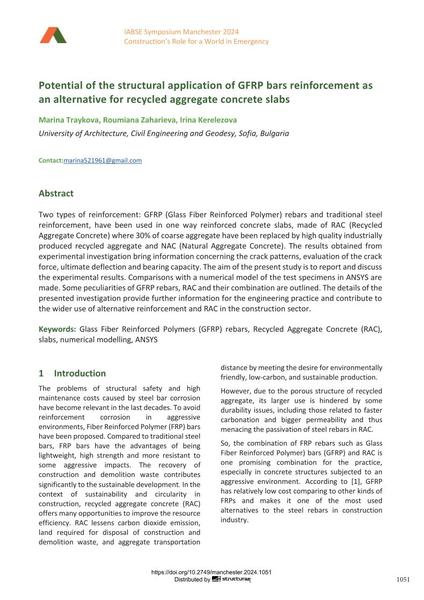Potential of the structural application of GFRP bars reinforcement as an alternative for recycled aggregate concrete slabs

|
|
|||||||||||
Détails bibliographiques
| Auteur(s): |
Marina Traykova
(University of Architecture, Civil Engineering and Geodesy, Sofia, Bulgaria)
Roumiana Zaharieva (University of Architecture, Civil Engineering and Geodesy, Sofia, Bulgaria) Irina Kerelezova (University of Architecture, Civil Engineering and Geodesy, Sofia, Bulgaria) |
||||
|---|---|---|---|---|---|
| Médium: | papier de conférence | ||||
| Langue(s): | anglais | ||||
| Conférence: | IABSE Symposium: Construction’s Role for a World in Emergency, Manchester, United Kingdom, 10-14 April 2024 | ||||
| Publié dans: | IABSE Symposium Manchester 2024 | ||||
|
|||||
| Page(s): | 1051-1057 | ||||
| Nombre total de pages (du PDF): | 7 | ||||
| DOI: | 10.2749/manchester.2024.1051 | ||||
| Abstrait: |
Two types of reinforcement: GFRP (Glass Fiber Reinforced Polymer) rebars and traditional steel reinforcement, have been used in one way reinforced concrete slabs, made of RAC (Recycled Aggregate Concrete) where 30% of coarse aggregate have been replaced by high quality industrially produced recycled aggregate and NAC (Natural Aggregate Concrete). The results obtained from experimental investigation bring information concerning the crack patterns, evaluation of the crack force, ultimate deflection and bearing capacity. The aim of the present study is to report and discuss the experimental results. Comparisons with a numerical model of the test specimens in ANSYS are made. Some peculiarities of GFRP rebars, RAC and their combination are outlined. The details of the presented investigation provide further information for the engineering practice and contribute to the wider use of alternative reinforcement and RAC in the construction sector. |
||||
| Mots-clé: |
ANSYS
|
||||
